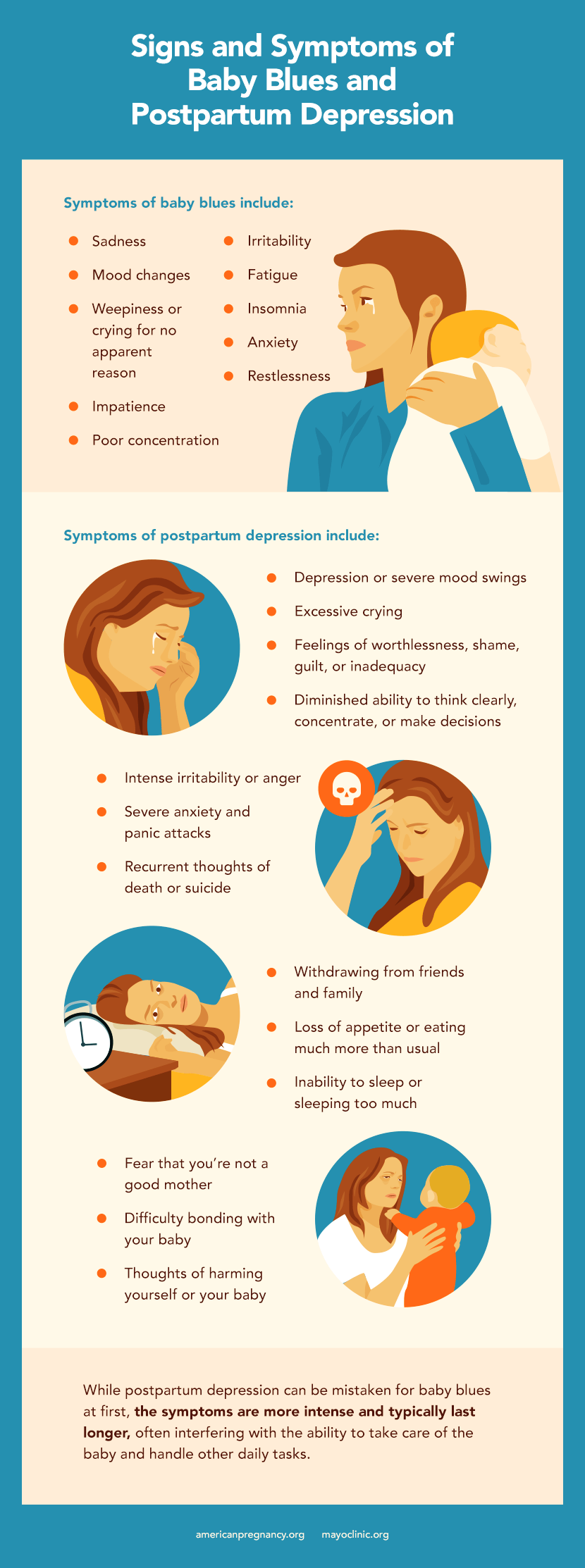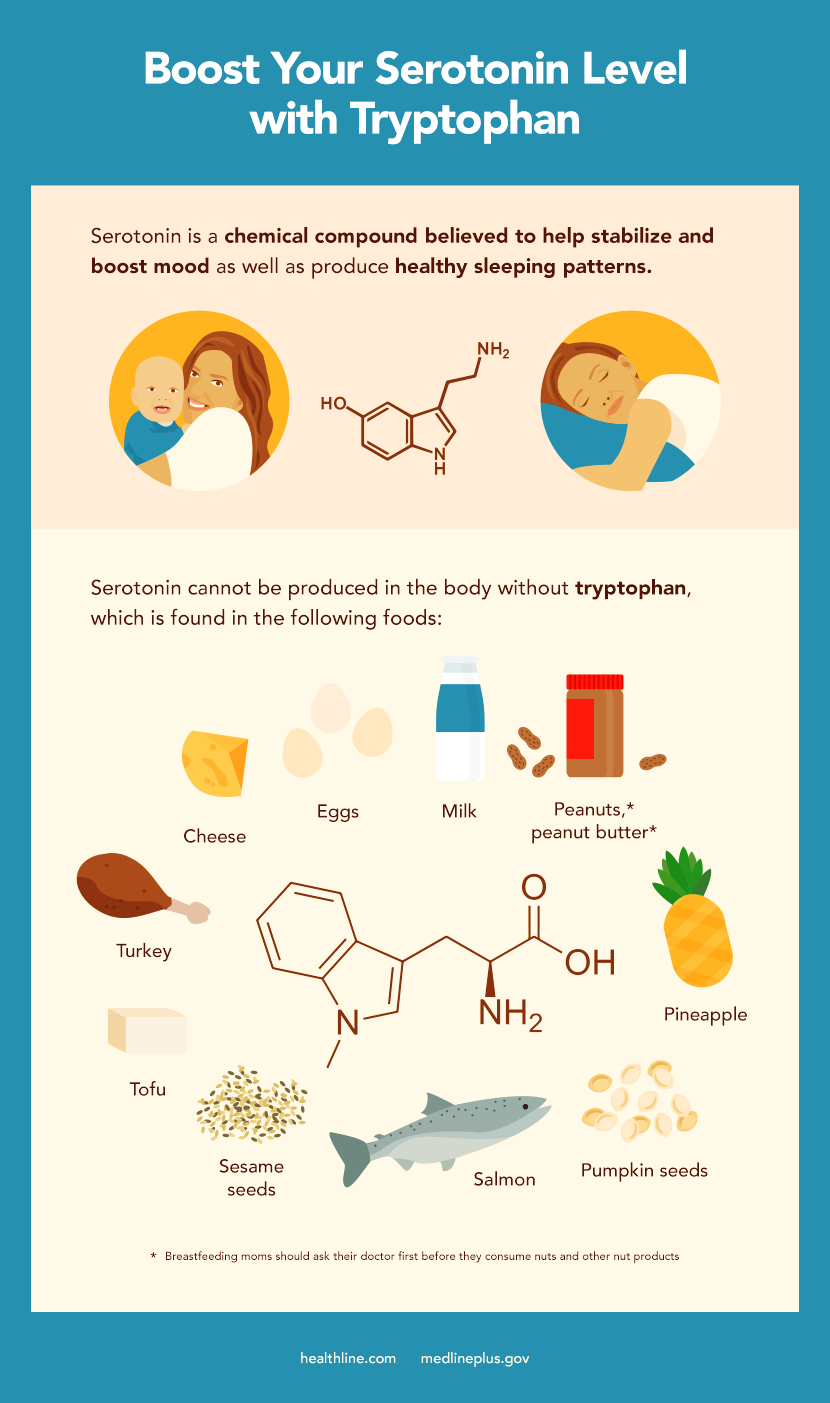Eating After Baby:
Eating Right to Help Ease the Symptoms of Postpartum Depression
Having a baby can be a positive experience for many mothers and fathers. In fact, we often have the expectation that we’ll feel happy and fulfilled as we welcome a new life into the world.
Yet with the introduction of a new family member, parents have some major readjustments to deal with: Babies lead to a loss of independence, changes in financial status and/or security, and sometimes upheaval in relationships (among many other things).
Although parents may feel prepared for these changes, having a baby can still be a very difficult adjustment. More often than not, when time and independence go out the window, so does eating right.
But while eating healthy, nourishing foods may be the last thing on our minds when there’s a new baby to care for, it’s a crucial component to healing after delivery and reducing the risk of postpartum depression.
Read on to learn how baby blues, postpartum depression, and nutrition all connect.
Baby Blues
Approximately one in two mothers experience what’s sometimes called “baby blues” after the birth of a child.http://americanpregnancy.org/first-year-of-life/baby-blues/
The blues typically happen between three and five days after delivery and coincide with the hormonal changes that occur as the breast milk starts to develop.http://www.rcpsych.ac.uk/healthadvice/problemsdisorders/postnataldepression.aspx
Mothers may feel weepy and irritable, and lack confidence in their ability to care for a baby. This is a normal occurrence that typically subsides after a week or so. It is perfectly okay to have a good cry and talk to someone about how you feel.
New mothers need lots of tender loving care and reassurance that their feelings are normal.

Postpartum Depression
Postpartum depression (PPD) is a recognized and treatable condition that affects approximately 10 to 15 percent of women.http://www.nhs.uk/conditions/Postnataldepression/Pages/Introduction.aspxhttp://www.rcpsych.ac.uk/healthadvice/problemsdisorders/postnataldepression.aspxDepression after baby isn’t limited to women.
In fact, a recent study found depression among new fathers increased 68 percent during the first five years of their children’s lives.http://pediatrics.aappublications.org/content/early/2014/04/09/peds.2013-3262
The illness can affect anyone, regardless of background, and can occur immediately after delivery, but often does not get acknowledged or recognized until later on.
The most common signs and symptoms of PPD are low mood, anxiety, inability to look forward to anything, lack of motivation, and extreme tiredness. Some mothers experiencing PPD say they feel very different than they did before the baby was born.
This lack of motivation plus extreme fatigue may alter appetite or the drive to cook a good, healthy meal.
If you’re experiencing symptoms of PPD, discuss all of the options with your doctor to find a treatment plan that works for you. Doctors may suggest counseling or refer mothers to a Community Mental Health team with expertise in this area.
Support groups are a great place to share similar feelings as well as the practical challenges of motherhood – including finding the time to feed yourself, your baby, and any other family members.
Ask other parents what works for them in terms of quick and healthy meals and snacks.
While some women experiencing PPD may benefit from a combination of treatments, including counseling or antidepressants, healthy food can help reduce symptoms too.http://www.babycenter.com/404_are-postpartum-depression-medications-safe-for-nursing-moms_11718.bc

Tips for Moms to Stay Well Fed
Eating well when experiencing postpartum depression is no easy feat, but it is one of the best things you can do for yourself, your recovery, and your baby. Here are some strategies to make sure you stay well fed with healthy, nutritious meals and snacks.
Prepare before the baby arrives
A lot of time and thought may go into the nursery, gear, clothing, and everything else that will help you keep your baby comfortable and fed.
Use this time to do a little meal prep for yourself (your crockpot and freezer will become two of your closest friends).
Include meals you can eat one-handed or while standing, including breakfast burritos, veggie burgers, muffins, and whole-wheat pizza pockets.http://www.thekitchn.com/5-dos-donts-for-freezing-meals-before-baby-arrives-216363 Divide big batches of crockpot meals into freezable containers that you can thaw when you need them.
These can include roasted chicken, curries, meatloaf, and oatmeal. Focus on healthy grains, vegetables, eggs, meat, and fruit in these freeze-ahead meals so you can rest assured you’ll get the nutrients you need after your baby is born.https://www.buzzfeed.com/morganshanahan/make-ahead-meals-to-prep-before-you-have-that-baby?utm_term=.gcB17EV2nV#.xiN9VMrZRr
Eat small meals throughout the day
Focus on small, regular meals high in complex carbohydrates, essential fats, and protein to prevent blood sugar levels from plummeting.
When blood sugar levels are unstable and low, depression and anxiety can feel worse, so it’s important to keep them stable.http://www.medicalnewstoday.com/articles/278640.php
Small meals not only keep your energy up, but are often easy to prepare in just a few minutes, which is an especially important factor when all eyes are on the baby.
The word “meal” may make you think of hard work in the kitchen, but that doesn’t have to be the case. Some great postpartum staples you can add to your grocery list include:
- Fresh fruit, including apples and coconut pieces
- Grains, including brown rice, rice cakes, rye bread, and wheat-free pasta
- Nuts and seeds, including pumpkin seeds, sunflower seeds, flax seeds, tahini, walnuts, and almonds (check with your doctor before eating nuts if you are breastfeeding)
- Legumes, including chickpeas, lentils, and hummus
- Vegetables, including avocadoes, sweet potatoes, and root vegetables
- Meat and dairy, including organic cheese, eggs, milk, chicken, and turkey
- Fish, including salmon, sardines, and tuna
- Natural sweeteners, including local or Manuka honey
With these staples, you can make plenty of small meals including:
- Half an avocado on rye toast
- A thumb-sized piece of cheese with an apple
- 1 tablespoon of honey spread over three rice cakes with some nut butter or tahini
- Soup with root vegetables, garlic, onions, and ginger, plus pasta or rice
- Oatmeal made with 1 teaspoon of honey and 1 tablespoon of seeds
- A sweet potato with hummus
- Pasta with olive oil and seeds with shredded organic cheese
- Half an avocado with seeds
- Rye bread with honey and organic cheese
- A handful of nuts and seeds, or just seeds (try toasting seeds on a hot frying pan for a few minutes for a richer flavor)
- A boiled organic egg on rye toast
- A baked apple with or without honey, and a handful of seeds
Each of these meals will take less than five minutes to prepare. The key here is not to buy foods that are ready made, because the salt and sugar contents in processed foods may contribute to your symptoms.
Try to buy organic whenever possible, especially with animal products; non-organic animal products can contain hormones that may overload the liver.
Steer clear of quick fixes
Quick energy fixes in the form of caffeinated drinks, chocolate, and simple carbohydrates come at a price. While they may make you feel energized in the short term, they do not provide lasting energy.
Rather than gain a temporary energy boost from a latte or cookie, try a snack that combines protein and carbs, like an apple with peanut butter.http://www.health.com/health/article/0,,20411476,00.html
Ask for help
If you don’t feel up to cooking, consider asking a friend or family member for help. And if someone offers to help, take them up on it. Do not feel guilty about the way you feel. Support from friends and family can help you get through this difficult time.
Let research be your guide
Research links a number of micronutrients and minerals to PPD symptom reduction.http://www.ncbi.nlm.nih.gov/pmc/articles/PMC3564601/ These include polyunsaturated fatty acids (found in flaxseed oil, walnut oil, sunflower seeds, salmon, and tuna),
B-vitamins (found in whole grains, nuts, seeds, and yogurt), vitamin D (found in milk, eggs, tuna, and sardines), zinc (found in oysters, beef, almonds, yogurt, and chickpeas),
and selenium (found in Brazil nuts, brown rice, tuna, and shrimp).
Consider supplements
Just as food sources of certain vitamins and minerals can benefit PPD symptoms, so too can some supplements. Those beneficial to symptoms include Omega-3 fish or flaxseed oil, vitamin B complex (100 milligrams taken every morning), zinc, and magnesium.http://www.ncbi.nlm.nih.gov/pubmed/14978781http://www.virginiahopkinstestkits.com/postpartumdep.html
If you are breastfeeding or expressing, there are multivitamins that can help boost nutrients for you and your baby. Always check with your doctor or pharmacist before taking any supplements, especially if you are breastfeeding or taking medications.
Stock up on serotonin
When the feel-good chemical serotonin is low, mood can go down and anxiety levels can go up. So by increasing the level of serotonin, you can help speed PPD recovery.
But because serotonin cannot be produced in the body without the amino acid tryptophan, it’s important to eat tryptophan-rich foods such as eggs, cheese, salmon, turkey, pumpkin seeds, and pineapple.http://www.healthline.com/health/healthy-sleep/foods-that-could-boost-your-serotonin

Putting effort into your eating is one of the most helpful things you can do after delivering your baby.
Embed the article on your site

